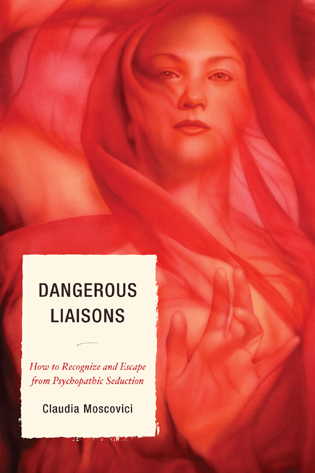
So far I’ve asked you to imagine a person who lacks empathy for others and the capacity to feel any emotion deeply. I’ve asked you to imagine a person who is plagued by restlessness and boredom and finds sole satisfaction in duping, manipulating and controlling others. A person who may simulate respect or politeness, but who fundamentally regards others with contempt, as objects to be used for his temporary diversion or satisfaction. A person who suffers from an incurable and absolute egocentrism.
But even this doesn’t even begin to give you a full picture of the extent of a psychopath’s emotional poverty. It may describe what a psychopath can’t feel, but to understand how and why the psychopath is driven to harm others, you need to also get a sense of what a psychopath does feel. Psychopaths can’t tolerate loneliness. Just as all human beings can’t survive physically without food and water, psychopaths can’t survive emotionally without victims.
Of course, psychopaths regard love with contempt. They view loving and loyal couples as an ugly, undifferentiated blob. Because they can’t experience or even understand love and loyalty, they see moral individuals as weak. They have nothing but disdain for the emotions that normal human beings feel. But at the same time, psychopaths can’t live without feeding upon the real and deeper emotions of people who care about them, of individuals who can love: in other words of the people they use, abuse, toy with, lie to and hurt.
Psychopaths are often sexual predators. But even more often, and certainly more fundamentally, they’re emotional predators. What they want from their victims is far more than possessing their bodies or sex. They need to feed their insatiable appetite for harm, as well as sustain their sense of superiority, by possessing and destroying others inside and out, body and soul. A psychopath’s emotional framework is like a vacuum that needs to suck out the emotional energy from healthy individuals in order to survive. This is why I have called psychopaths real-life vampires, that we need to understand and worry about far more than their fictional counterparts.
A psychopath lacks much more than empathy for others in his emotional repertoire. He also lacks the capacity to experience any kind of emotion that requires deeper insight and psychological awareness. He experiences only proto-emotions, which are as short-lived as they’re intense. That doesn’t make them any less dangerous, however. The evidence points to the fact that Scott Peterson and Neil Entwistle preplanned their murders weeks in advance. But Mark Hacking seems to have acted more or less on impulse, after having fought with his wife. If we believe his confession to his brothers, Mark was in the process of packing up his things, ran across a revolver and shot Lori while she was asleep.
When angry or frustrated, a psychopath is capable of anything, even if his anger will dissipate a few minutes later. As Hervey Cleckley observes, “In addition to his incapacity for object love, the psychopath always shows general poverty of affect. Although it is true that be sometimes becomes excited and shouts as if in rage or seems to exult in enthusiasm and again weeps in what appear to be bitter tears or speaks eloquent and mournful words about his misfortunes or his follies, the conviction dawns on those who observe him carefully that here we deal with a readiness of expression rather than a strength of feeling.” (The Mask of Sanity, 349)
The proto-emotions experienced by a psychopath tie in, once again, to the satisfaction or frustration of his immediate desires: “Vexation, spite, quick and labile flashes of quasi-affection, peevish resentment, shallow moods of self-pity, puerile attitudes of vanity, and absurd and showy poses of indignation are all within his emotional scale and are freely sounded as the circumstances of life play upon him. But mature, wholehearted anger, true or consistent indignation, honest, solid grief, sustaining pride, deep joy, and genuine despair are reactions not likely to be found within this scale.” (The Mask of Sanity, 349)
For this reason, psychopaths don’t feel distress even when they land in jail. Even there they take pleasure in manipulating their fellow inmates and the prison staff. Even from there they write letters to people outside to use them for money, amusement and possibly even sex. Nothing ruffles a psychopath’s feathers for long. The same emotional shallowness that leads him to be unresponsive to the needs of others and to experience no remorse when he hurts them also enables him to feel little or no distress when he, himself gets hurt. So far, I’ve covered the emotions psychopaths can’t feel. I’ve also had the opportunity to witness up-close and personal the emotions a psychopath can feel, however. That’s what I’ll describe next.
The Psychopath’s Emotions: What Does He Feel?
1) Glee. A psychopath feels elation or glee whenever he gets his way or pulls a fast one on somebody. I can still recall O.J. Simpson’s reaction to getting away with murder (at least in my own opinion and that of a lot of other people who watched the trial, if not in the eyes of the jury): his celebratory glee at pulling a fast one on the American public, on the system of justice and especially on the victims and their families.
2) Anger. Robert Hare notes in Without Conscience that since psychopaths have low impulse control, they’re much more easily angered than normal people. A psychopath’s displays of anger tend to be cold, sudden, short-lived and arbitrary. Generally you can’t predict what exactly will trigger his anger since this emotion, like his charm, is used to control those around him. It’s not necessarily motivated by something you’ve done or by his circumstances. A psychopath may blow up over something minor, but remain completely cool and collected about a more serious matter. Displays of anger represent yet another way for a psychopath to demonstrate that he’s in charge. When psychopaths scream, insult, hit, or even wound and kill other individuals, they’re aware of their behavior even if they act opportunistically, in the heat of the moment. They know that they’re harming others and, what’s more, they enjoy it.
3) Frustration. This emotion is tied to their displays of anger but isn’t necessarily channeled against a particular person, but against an obstacle or situation. A psychopath may feel frustrated, for example, when his girlfriend doesn’t want to leave her current partner for him. Yet he may be too infatuated with her at the moment to channel his negative emotions against her. He may also believe that his anger would alienate her before he’s gotten a chance to hook her emotionally. In such circumstances, he may become frustrated with the situation itself: with the obstacles that her partner or her family or society in general pose between them. Psychopaths generally experience frustration when they face impersonal barriers between themselves and their current goals or targets. But that’s also what often engages them even more obstinately in a given pursuit. After all, for them, overcoming minor challenges in life is part of the fun.
4) Consternation. As we’ve seen so far, psychopaths don’t create love bonds with others. They establish dominance bonds instead. When those controlled by a psychopath disapprove of his actions or sever the relationship, sometimes he’ll experience anger. But his immediate reaction is more likely to be surprise or consternation. Psychopaths can’t believe that their bad actions, which they always consider justifiable and appropriate, could ever cause another human being who was previously under their spell to disapprove of their behavior and reject them. Even if they cheat, lie, use, manipulate or isolate others, they don’t feel like they deserve any repercussions as a result of that behavior. In addition, psychopaths rationalize their bad actions as being in the best interest of their victims.
For instance, if a psychopath isolates his partner from her family and persuades her to quit her job and then, once she’s all alone with him, abandons her to pursue other women, he feels fully justified in his conduct. In his mind, she deserved to be left since she didn’t satisfy all of his needs or was somehow inadequate as a mate. In fact, given his sense of entitlement, the psychopath might even feel like he did her a favor to remove her from her family and friends and to leave her alone in the middle of nowhere, like a wreck displaced by a tornado. Thanks to him, she can start her life anew and become more independent.
To put it bluntly, a psychopath will kick you in the teeth and expect you to say “Thank you.” Being shameless and self-absorbed, he assumes that all those close to him will buy his false image of goodness and excuse his despicable actions just as he does. In fact, he expects that even the women he’s used and discarded continue to idealize him as a perfect partner and eagerly await his return. That way he can continue to use them for sex, money, control, his image or any other services if, when and for however long he chooses to return into their lives.
When those women don’t feel particularly grateful—when, in fact, they feel only contempt for him–the psychopath will be initially stunned that they have such a low opinion of him. He will also feel betrayed by these women, or by family members and friends who disapprove of his reprehensible behavior. Although he, himself, feels no love and loyalty to anyone, a psychopath expects unconditional love and loyalty from all those over whom he’s established a dominance bond.
This mindset also explains psychopaths’ behavior in court. Both Scott Peterson and Neil Entwistle seemed outraged that the jury found them guilty of murder. Psychopaths believe that those whom they have hurt, and society in general, should not hold them accountable for their misdeeds. After all, in their own minds, they’re superior to other human beings and therefore above the law. How dare anybody hold them accountable and punish them for their crimes!
5) Boredom. This is probably the only feeling that gives psychopaths a nagging sense of discomfort. They try to alleviate it, as we’ve seen, by pursuing cheap thrills, harming others and engaging in transgressive behavior. Nothing, however, can relieve for long the psychopath’s fundamental ennui. He gets quickly used to, and thus also bored with, each new person and activity.
6) Histrionic flashes. I’m not sure if this is an emotion, but I know for sure that the psychopath’s dramatic displays of love, remorse and empathy lack any meaning and depth. If you watch the murder trials on the news or on Court TV, you’ll notice that some psychopaths convicted of murder often put on shows of grief, sadness or remorse in front of the jury. The next moment, however, they’re joking around and laughing with their attorneys or instructing them in a calm and deliberate manner about what to do and say on their behalf. The displays of emotion psychopaths commonly engage in are, of course, fake. They’re tools of manipulation–to provoke sympathy or gain trust–as well as yet another way of “winning” by fooling those around them.
I’ve already mentioned that Neil Entwistle engaged in such histrionic behavior. If you’ve followed crime features on the news, you may have noticed that Casey Anthony, the young woman accused of killing her toddler, behaves similarly. She was observed going out to dance and party at clubs with friends the day after her daughter, Caylee, disappeared. Casey’s lack of concern for her missing child doesn’t necessarily prove that she murdered her. But it reveals highly suspicious and callous behavior. It also casts doubt upon the brief and dramatic displays of grief or concern that she sometimes puts on in front of the media and for her parents.
7) Infatuation. When they identify someone as a good potential target, psychopaths can become obsessed with that particular person. In Without Conscience, Hare compares the psychopath’s focused attention upon his chosen target to a powerful beam of light that illuminates only one spot at a time. He also likens it to a predator stalking its prey. Because psychopaths tend to ignore other responsibilities (such as their jobs and their families) and have no conscience whatsoever, they can focus on pursuing a given target more intensely than multi-dimensional, loving men could. This is especially the case if their target presents an exciting challenge, such as if she’s rich or famous, or if she’s married to another man, which triggers their competitive drive. This single-minded infatuation, however, like all of their proto-emotions, is superficial and short-lived. Because for psychopaths such obsessions don’t lead to any genuine friendship, caring or love, they dissipate as soon as they get whatever they wanted from that person, which may be only the conquest itself.
8) Self-love (sort of). Since psychopaths only care about themselves, one would think that self-love would be the one emotion they could experience more deeply. In a sense that’s true, since their whole lives revolve around the single-minded pursuit of selfish goals. But this is also what makes psychopaths’ self-love as shallow as the rest of their emotions. Just as they’re incapable of considering anyone else’s long-term interest, they’re incapable of considering their own. By pursuing fleeting pleasures and momentary whims, psychopaths sabotage their own lives as well. Rarely do they end up happy or successful. They spend their whole lives hurting and betraying those who loved and trusted them, using and discarding their partners, disappointing the expectations of their families, friends, bosses and colleagues and moving from one meaningless diversion to another. At the end of the road, most of them end up empty-handed and alone.
9) CONTEMPT. I’ve capitalized this word because this is the emotion that dominates a psychopath’s whole identity and way of looking at other human beings. No matter how charming, other-regarding and friendly they may appear to be on the outside, all psychopaths are misanthropes on the inside. A psychopath’s core emotion is contempt for the individuals he fools, uses and abuses and for humanity in general. You can identify the psychopath’s underlying contempt much more easily once he no longer needs you or once his mask of sanity shatters. As we’ve seen, psychopaths hold themselves in high regard and others in low regard. To describe the hierarchies they construct, I’ll use an analogy from my literary studies. I was trained in Comparative Literature during they heyday of Jacques Derrida’s deconstruction as it was being applied to pretty much everything: cultural studies, gender hierarchies, race relations, post-colonialism and the kitchen sink.
Although looking at life in general in terms of “indeterminate” binary hierarchies hasn’t proved particularly useful, this polarized worldview describes rather well the mindset of psychopaths. For such disordered, narcissistic and unprincipled individuals, the world is divided into superiors (themselves) and inferiors (all others); predators (themselves) and prey (their targets); dupers (themselves) and duped (the suckers). Of course, only giving psychopaths a lobotomy would turn these binary hierarchies upside down in their minds. This is where the applicability of Derrida’s deconstructive model stops. Although psychopaths consider themselves superior to others, they distinguish among levels of inferiority in the people they use, manipulate and dupe.
The biggest dupes in their eyes are those individuals who believe whole-heartedly that the psychopaths are the kind, honest, other-regarding individuals they appear to be. As the saying goes, if you buy that, I have some oceanfront property in Kansas to sell you. Such individuals don’t present much of a challenge for psychopaths. They’re usually quickly used up and discarded by them. The second tier of dupes consists of individuals who are lucid only when it comes to the psychopath’s mistreatment of others, not themselves. Wives and girlfriends who are clever enough to see how the psychopath cheats on, lies to, uses and manipulates other people in his life, but vain or blind enough to believe that they’re the only exception to this rule form the bulk of this group.
This brings to mind an episode of a popular court show I watched recently. A woman testified on behalf of the integrity and honesty of her boyfriend. As it turns out, he had cheated on his wife with her (and other women as well). But his girlfriend nonetheless staunchly defended his character. She maintained that even though she knew that her lover was a cheater and a liar, because she herself was such a great catch and because they had such a special and unique relationship, he was completely faithful and honest to her. The judge laughed out loud and added, “…that you know of!”
Women who are cynical enough to see the psychopath’s mistreatment of others yet gullible enough not to see that’s exactly what he’s doing to them constitute his preferred targets. Such women are not so naive as to present no challenge whatsoever for the psychopath. But they’re definitely blind enough to fall for his manipulation and lies. A psychopath will wrap several such women around his little finger. Those who finally see the psychopath’s mistreatment as a sign of his malicious and corrupt nature occupy the third rung of the hierarchy. They’re usually women who have been burned so badly by the psychopath that they don’t wish to put their hands into the fire again.
Claudia Moscovici, psychopathyawareness
Dangerous Liaisons: How to Identify and Escape from Psychopathic Seduction
July 27, 2015
Categories: bad men, cat and mouse games, charismatic psychopaths, Charismatic Psychopaths: Mark Hacking and Neil Entwistle, Claudia Moscovici, confusing relationships, Dangerous Liaisons, dangerous men, dating, deception, denial, devalue and discard, domestic abuse, domestic violence, Dracula, emotional abuse, emotional predators, emotional vampires, evil, faces of evil, Hervey Cleckley, how to recognize a psychopath, insincerity, Jekyll and Hyde Personalities, Martha Stout, mental health, narcissism, Neatorama's Bitlit, Neil Entwistle, personality disorders, psychology, psychopath, psychopathic seducer, psychopathic seduction, psychopaths and emotion, Psychopaths: The Real-Life Vampires, psychopathy, psychopathy awareness, psychopathy symptoms, psychopathy traits, psychopathyawareness, Robert Hare, sex addict, sexual addiction, social predators, sociopath, the psychopath's emotions, The Seducer, The Seducer: A Novel, The sociopath next door, toxic relationships, vampires, victim, victim profile, what is a psychopath, why psychopaths are evil, Without conscience, Women who love psychopaths . Tags: bad men, Bitlit, Claudia Moscovici, contempt, controlling men, Dangerous Liaisons, dangerous men, dangerous relationships, dating bad men, dating dangerous men, domestic violence, dominance bonds, emotional abuse, emotional predators, emotional vampires, hatred, Hervey Cleckley, how a psychopath sucks the life out of you, narcissism, Neatorama's Bitlit, pathological lying, personality disorders, psychology, psychopathic seduction, psychopaths, psychopathy awareness, psychopathyawareness, social predator, social predators, sociopath, sociopathy, superiority complex, The Mask of Sanity, the psychopath's emotions, The Psychopath's Emotions: What Does He Feel?, The Seducer, The Seducer: A Novel, The Seducer: A Novel about Psychopathic Seduction, toxic relationships, Without conscience . Author: Holocaust Memories . Comments: 16 Comments













